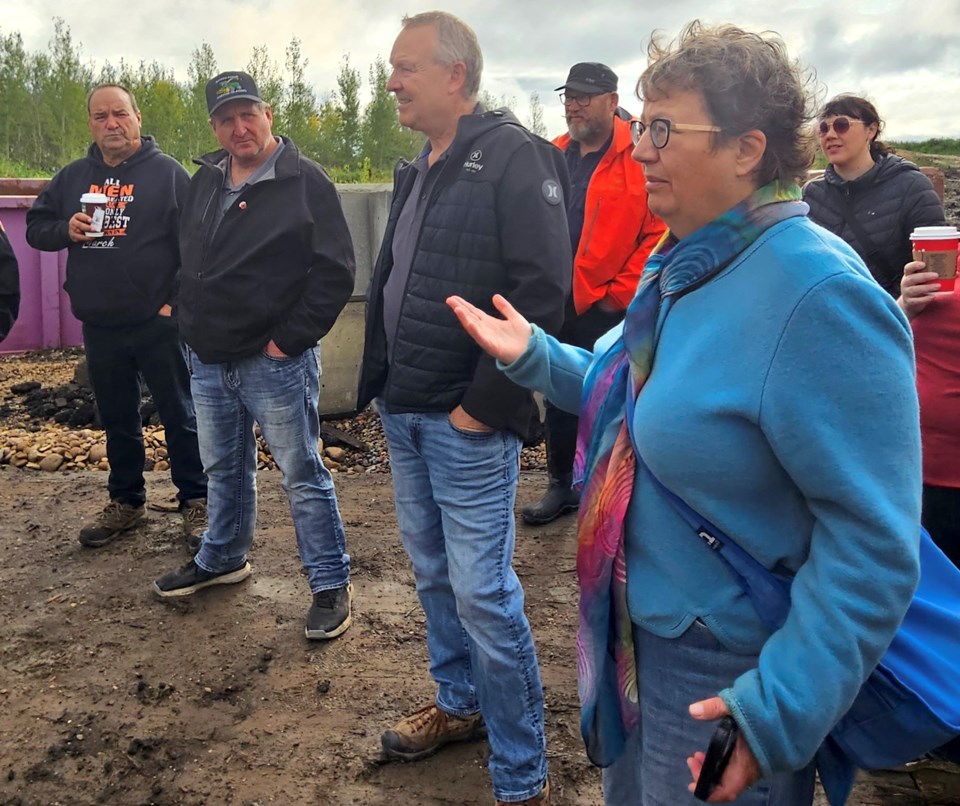WESTLOCK — Creating healthy soil and understanding the role compost plays was front and centre of an Aug. 24 circular economy tour at the AltRoot composting facility located at the Westlock Regional Landfill.
AltRoot’s Brian Wonnacott and Colby Hansen provided details about their composting operations to about 30 guests including Alberta senator Paula Simons, and those from Agriculture and Agri-Food Canada, the Circular Innovation Council, Alberta Innovates, Gateway Research Organization, and councillors from Westlock County, Village of Clyde and Town of Westlock.
The tour focused on the work that AltRoot is doing with the Gateway Research Organization (GRO) and Results Driven Agriculture (RDAR), a federal program aimed at improving soil health and introducing “new practices to help farmers farm more environmentally friendly,” said Hansen. It also highlighted the partnerships between AltRoot and the Town of Westlock, Westlock County and the Westlock Regional Waste Management Commission.
“We’re highlighting our business model and how it can be a best management practice standard throughout Canada or the world, for organic waste diversion,” said Hansen, noting guests also visited the GRO/University of Alberta compost research plots and results-driven agriculture research project site that are located on his farm and learned about their work including greenhouse gas reduction, soil health, soil amendments and proving the value of compost.
“We’re supporting a viable, realistic action to a waste problem, climate problem, environmental problem,(as well as) soil health initiatives, greenhouse gas reduction, healthier food for people and supporting communities and businesses.”
In making compost locally, AltRoot supports about 17 local businesses and have employed several people via the operation.
“We have to remember that there’s other added value to (this compost) as far as refining it more or making other byproducts from it. That’s going to create even more jobs in the community and AltRoot is dedicated to supporting that,” explained Hansen.
Simons an independent senator from Edmonton, is deputy-chair for the Standing Committee on Agriculture and Forestry that is currently undertaking an “intensive and ambitious study of soil health in Canada”. She met Wonnacott and Hansen last fall at conference in Edmonton and was invited to tour the AltRoot facility.
This was the first tour of several around the Edmonton area that the senator and her staff are conducting to gather facts and information for the committee’s soil study she said, noting other tours were planned for Calgary, Fort Macleod and Saskatoon.
“Understanding the role of compost is really important to understanding how we enrich our soil, not just for fertility but for the sequestration of carbon,” said Simons, pointing out the soil study has been ongoing for about a year and will be the first report done in Canada in 40 years.
Last spring, she was part of a similar senate tour in Guelph, Ont. and also attended the United Nations Food and Agriculture Organization’s global soil partnership plenary session in July in Rome.
“We really want to look, not just at soil health but what government policies we need to adopt to encourage soil health because healthy soil sequesters carbon, healthy soil helps us to manage water, drought and flooding because healthy soil will absorb and retain water and of course, it helps us to grow more nutritious crops,” she said.
Simons noted the backlash from some Canadians when the government asked farmers to cut back on their nitrogen use last summer, and pointed out that while there will be a reduction in usage, there will also be benefits.
“If we’re serious about climate change we have to reduce nitrogen emissions and I think a smart composting strategy on a large scale can be a really important part, it can be just one part of what we do to mitigate nitrogen use,” said Simons. “We can’t go cold turkey on fertilizer but if we’re looking for inventive ways to reduce carbon emissions and reduce nitrogen emissions, composting can be a really important part of that strategy and the strategy of building healthy soil.”



